#especially in aziraphale's context
Explore tagged Tumblr posts
Text
it's the way the season started out with crowley leaving the bookshop after a fight and the season ended with crowley leaving the bookshop after a kiss. it's the way it started out with crowley being offered to be a duke of hell and it ended with aziraphale being offered to be the supreme archangel.
it's the way the second episode started with crowley saying: "well i am a demon. maybe i'm lying", and it ended with crowley telling aziraphale: "well i am a demon. i lied."
it's the way the third episode started with crowley perching beside aziraphale on the armchair and across from an angel who was new to earth, and it ended with crowley telling gabriel: "it's always too late." it's the way the fourth episode started with the demon sent to take crowley's place getting aziraphale's help and it ended with aziraphale helping crowley move the plants back into the bentley
it's the way the fifth episode started with crowley being reluctant about the shopkeeper's association meeting and it ended with crowley rescuing everyone there. it's the way the sixth episode started out with crowley wandering around heaven and it ended with crowley refusing to go to heaven with aziraphale
it's the way they've moved in circles for the past thousands of years around each other, and the episodes move in circles too but not quite a perfect circle because they're still trying to figure out where they are between the lines but it's also the way aziraphale told crowley to look him in the eye and tell him that crowley wanted to kill job's children, and crowley lied to aziraphale about it because he wanted to see how far aziraphale would go along with a demon as forsaken as him, and it's the way crowley said no to god then
it's the way the season ends with crowley telling aziraphale to tell me you said no. and aziraphale couldn't. it's the way they both want to be with each other. it's the way aziraphale was the one who came to crowley first. it's the way the season starts with aziraphale dropping down to greet crowley who was standing there in the dark, and the season ends with aziraphale standing there going up and crowley driving away
#it's about history repeating itself#but in a different way each time#and maybe that's how change and growth and healing happen#in circles sometimes and not quite linear#but still there#especially in aziraphale's context#good omens#good omens 2#good omens spoilers#good omens 2 spoilers#aziraphale#crowley#ineffable husbands#this will probably make no sense to me in the morning but#i am STILL not okay and i needed to write thoughts down#neil was insane for this season#and i absolutely adore it
545 notes
·
View notes
Text
Almond and Barley…
Almond syrup is also known as Orgeat syrup(which most of the time now includes other things like orange blossom water or rose water). It used to be made with barley and almond blend. Thats where the name comes from.
“The word “orgeat” has its origins in the French word for barley, as the original syrup was a mix of barley and almonds.”
Where does barley come in Good Omens specifically with Aziraphale?
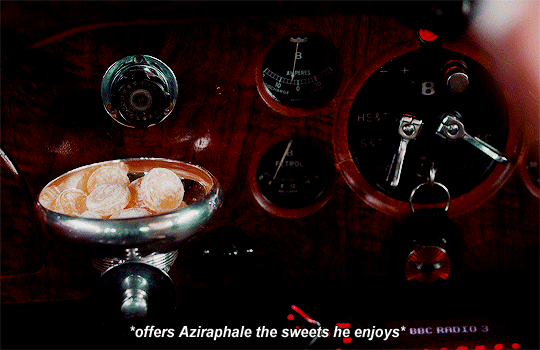

#good omens#good omens 2#crowley#aziraphale#ineffable husbands#good omens spoilers#go2#good omens speculation#david tennant#michael sheen#neil gaiman#theory#good omens meta#good omens thoughts#first I don’t really believe in the coffee theory#the deep dive really started with Aziraphale’s magic words but#it really kept going with almond syrup#it just feels specific(especially with the biblical context and reasoning)
107 notes
·
View notes
Text
at that point where i wish i had more than one friend who'd do loser ass matching discord icons with me. what ever.
#issues tag#i guess. technically.#for context im looking at aziraphale gifs for possible icons for next month and theres so many#with crowley that would go so hard as a matching icon but my only friend who would be up for matching icons#has a gf now so probably wont be up for that#especially considering the fact that. the characters are romantically involved. lol.#this sucks but whatever ill cope#its a non issue really im just hashtag lonely
1 note
·
View note
Note
I am going to lose my mind if in 12-24 months we see Neil Gaiman appearing in a bit part in a movie and discover that he was referring to himself, with female pronouns, in this answer.
It is not beyond possibility.
Hi Neil! I was wondering, when you said you had made plans to have a 50’s feminine Crowley and Aziraphale in season two, what was your plan? Did you plan to have Michael and David dress up in feminine clothing/wigs/etc, or were you thinking of casting actresses to play them? Or did you not get that far into thinking of it? This question has been bugging me for a while.
We were waiting to see what the writer gave us to see what was needed, but she got busy acting in a movie and stopped and so we never went further than that.
(Lots of people thought it was Phoebe Waller-Bridge, but it wasn't. Different movie, different writer/actress.)
#neil gaiman#david tennant#michael sheen#are probably all comfortable with the entire charcuterie board of pronouns when you really get down to it#especially given the context of the ask#and since both DT and MS have appeared on screen in women's clothes why on Earth would they recast#crowley is so gender#crowley has all the genders#aziraphale would do it for the bit
712 notes
·
View notes
Text
I don't think that The Kiss is the big reveal in The Final 15.
Neither is Aziraphale getting into the lift/elevator.
The very last thing we hear-- Tori Amos' cover of "A Nightingale Sang in Berkeley Square"-- being the song Crowley hears in The Bentley?
That's actually the biggest thing in 2.06.
It's arguably one of the biggest reveals in the series to date. How so?

Because this moment canonizes that "A Nightingale Sang in Berkeley Square" is not only a song that the show chose to play over the end of S1 for only the audience to hear... it is, indisputably, Crowley and Aziraphale's song.
This moment says that they have a song.
This moment says that their song contains lyrics about being "so in love" that "the whole world seemed upside down."
This moment says, without any doubt, that they're already a couple.
It exists in a way that completely undercuts any idea that the kiss that occurred a few moments prior was their first one-- even as the story is also designed in such a way as to lead some viewers to think that it might be.
This moment takes the heavily-evidenced-but-still-kinda-theoretical and makes it clear to the audience that they were correct about what they put together about Crowley and Aziraphale's relationship to this song in S1.
It says that when we heard the pianist in The Ritz scene in 1.06 playing an instrumental version of this song? As we suspected, it wasn't a coincidence. As of 2.06, we can go ahead and see that bit of S1 for what it was-- that she was playing it because Crowley and Aziraphale had requested it, wanting to hear their song.

It says that those of us whose ideas that this song might have meaning to Crowley and Aziraphale based off of Aziraphale's "dine at The Ritz" in 1967 and the song containing the lyrics about angels dining at The Ritz, along with how much of a relationship conversation 1967 is, were correct.

It says that Crowley and Aziraphale have a song. A romantic one, with unambiguous lyrics about being in love. A song they already had prior to S1 because they requested it at The Ritz in the S1 finale. A song they already had prior to 1967, when Aziraphale was using its lyrics as shorthand between them.
In S1, Tori Amos' cover of their song was used non-diegetically over the end of the season-- meaning, only we could hear it. The characters could not. Clues existed that the song had meaning to them but we didn't have overt proof of that in S1.
We do now.
We do as of the end of S2, where the same cover of the song was used diegetically. It's now one that Crowley can hear as well as we can, as The Bentley plays it for him. Likely because Aziraphale asked it to. It now exists within the characters' story-- not just as music playing for our benefit over their story.
I think that this ten or so seconds of the song playing when Crowley gets into The Bentley are given to us so we can reframe our ideas of what is going on-- especially what was happening in The Kiss scene-- around this knowledge.
Like most of Good Omens' important things, it's a narrative magic trick. It's information relevant to what came before it that is only received later. Its existence then changes the context of the prior scenes and recontextualizes our understanding of what we were watching.
Right now, the audience is looking mostly here:

And, if they're not, they're looking over here:

And there's certainly much to look at in those both of those moments, for sure, but... the actual last moment of S2 is the big thing. It's the one that says that this isn't a story about a couple that has never gotten together; this is a story about a forbidden, secret romance.
They're a couple who has spent their existence pretending they're not one-- not to one another but to the world. The last few years? Not really, as Crowley said... but, also, not really openly, either. There's a South Downs Cottage with their name on it in The Finale, though...

#good omens#ineffable husbands#crowley#aziraphale#aziracrow#good omens meta#good omens 2#crowley x aziraphale
589 notes
·
View notes
Text
I was rewatching s1e3 and something finally clicked for me..
Please forgive me if this seems obvious to you. It helps me to type out my thoughts, but I'm sure I'm just an idiot and no one else needs this explained to them, lol. That said - I was always slightly confused by the emotional weight of the holy water arc during the flashback sequence. Particularly I was confused by how angry Crowley got when Aziraphale referred to their relationship as fraternizing in the 1862 fight. I mean, "to associate or form a friendship with someone, especially when one is not supposed to" is exactly what they are doing, right? So why the 80 year breakup?
Crowley says he wants the holy water for if "it" all goes pear shaped. The phrasing is necessarily vague, and could mean lots of things. Since I know what he eventually uses it for, I was thinking about it in the context of Armageddon, or maybe more generally and vaguely about Crowley not always choosing to go along with Hell, and associating with Aziraphale. But there was not much reason for Crowley to already be thinking about Armageddon back then.
As we know from the full diary entry Neil posted, the timeline of the Edinburgh entry, and the cut bookshop opening scene, it seems like Crowley and Aziraphale were spending A LOT of time together by the 1800's. When Crowley is pulled back down to Hell in 1827, he learns that Hell is paying more attention to him than he'd previously thought. Crowley realizes at this point that spending so much time with Aziraphale is actively putting him in real danger. He recognizes that, and instead of breaking things off, or seeing Aziraphale less, he doubles down. If this relationship is dangerous, then he wants the tools to fight for it.
That's what I think I didn't get about the holy water request. It's not just general insurance, it's specifically insurance for if Hell finds out about him and Aziraphale. It's also a super vulnerable request because in making it, Crowley is openly acknowledging how important their relationship is to him. Aziraphale casually brings up the arrangement at the beginning of the conversation, and that's part of it, right? Because the whole basis of their relationship is the arrangement. It continues to be the pretense under which they meet, despite the relationship clearly having developed beyond that. And the arrangement, as Crowley proposed it in 537, is born out of convenience, and the assumption that Heaven and Hell would never notice anyway.
Crowley's request for insurance breaks that facade. He's acknowledging that it's not convenient, or safe, but he wants to do it anyway, despite the risk.
Aziraphale, on the other hand, is not ready for the screen to be taken away so abruptly. To make it worse, he assumes Crowley wants the holy water as an escape, rather than a weapon. Suddenly he is confronted with both the danger their association poses, and the idea that Crowley might choose to take his own life. He can't imagine the guilt of being directly responsible for the latter.
I also think the strength of his own emotional response to the thought of losing Crowley catches Aziraphale off guard. He hasn't admitted to himself how much he actually cares, and it scares him. Worrying about Heaven is more comfortable and familiar, so he falls back on that and switches to "If they knew I'd been... fraternizing!"
But bringing up the threat of Heaven reads to Crowley as Aziraphale saying "You may be willing to put yourself at risk for the sake of our relationship, but I am not." The word choice of "fraternizing" comes off as a dismissive and demeaning way to describe a relationship that Crowley just admitted he would risk his life for.
It's an unintentionally deep cut when Crowley is already at his most vulnerable, and so he lashes out. As far as we've seen, this is possibly the first time Crowley has truly lashed out at Aziraphale. So yeah, 80 year breakup makes sense!
And what makes this so much worse is what happens next. Crowley reaches out again in 1941 with a dramatic gesture (rescuing Aziraphale from the Nazis, saving his books). It's clear they've missed each other. They don't discuss the fight, but it's there subtextually. Aziraphale, tentatively and thrillingly, refers to them as friends, for the first time ever. He tells Crowley that he trusts him.
And then, that very same night their worst fears are confirmed. Just when they've finally reconciled a fight over the dangers of their relationship, and just when Aziraphale has finally admitted that it is not a relationship of convenience, but genuine friendship, they are exposed. Crowley is going to face punishment from Hell, explicitly for being Aziraphale's "trusted confident", and he doesn't have insurance. If Aziraphale's trick hadn't succeeded, Crowley would have had no way to protect himself.
idk it just makes me feel things ok
2K notes
·
View notes
Text
Good Omens is queering TV/storytelling - part 1: GAZE

I would argue that part of why Good Omens is so refreshingly queer is because it does not cater to the male gaze (which centers around the preferences - aesthetic, romantic, sexual, visual, logical, emotional, political ... - of mainly white men in positions of power):
no oversexualization of groups or types of people: Women or characters that could be read as female presenting are not overly sexualized. In fact, some of them are shown to be grimy, slimy and not sexual at all. All of them are real characters and not just cardboard-cutout on-screen versions of male misogynistic fantasies. They portray real people with real people problems. They are human, or exempt from our categories when portraying angels or demons. There are no overly sexualized bodies in general (as has so far also often been the case with young gay men, PoC, etc.), no fetishization of power imbalances, and not exclusively youthful depiction of love and desire.

sex or sexual behavior is not shown directly (yet): All imagery and symbolism of sex and sexuality is used not to entice the audience but is very intimately played out between characters, which makes it almost uncomfortable to watch (e.g., Aziraphale being tempted to eat meat, Crowley watching Aziraphale eat, the whole gun imagery).
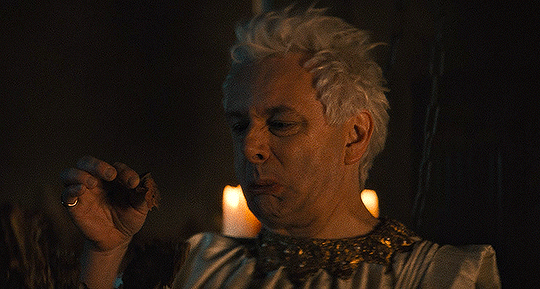
flaunting heteronormativity: Throughout GO but especially GO2, there is very little depiction of heterosexual/romantic couples; most couples are very diverse and no one is making a fuss about it. There is no fetishization of bodies or identities. Just people (and angels and demons) being their beautiful selves (or trying to).
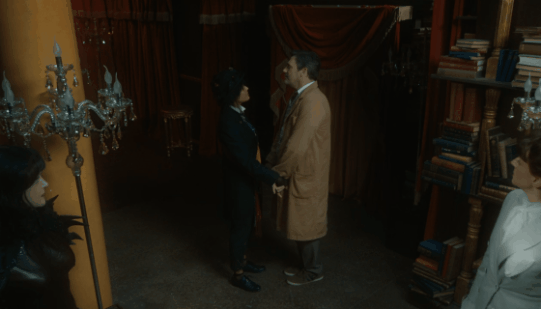
age: Even though Neil Gaiman explained that Crowley and Aziraphale are middle-aged because the actors are, I think it is also queering the idea of romance, love and desire existing mainly within youthful contexts. Male gaze has taught us that young people falling and being in love is what we have to want to see, and any depiction of love that involves people being not exactly young anymore is either part of a fetishized power imbalance (often with an older dude using his power to prey on younger folx) or presents us with marital problems, loss of desire, etc. – all with undertones of decay and patronizing sympathy. Here, however, we get a beautifully crafted, slow-burn, and somehow super realistic love story that centers around beings older than time and presenting as humans in their 50s figuring out how to deal with love. It makes them both innocent and experienced, in a way that is refreshing and heartbreaking and unusual and real.
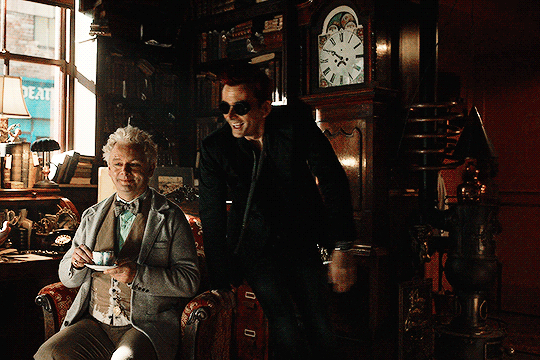
does not (exclusively) center around romantic/sexual love: I don’t know if this is a gaze point exactly but I feel like male gaze and resulting expectations of what a love story should look like are heavily responsible for our preoccupation with romantic/sexual love in fiction – the “boy gets girl” type of story. And even though, technically, GO seems to focus on a romantic love story in the end, it is also possible to read this relationship but also the whole show as centering around a kind of love that goes beyond the narrow confines of our conditioned boxed-in thinking. It seems to depict a love of humanity and the world and the universe and just the ineffability of existence as a whole.
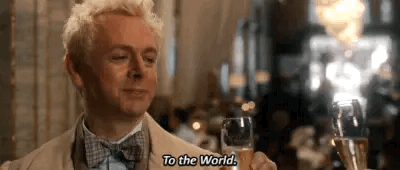
disability as beautiful and innate to existence: Disability is represented amongst angels by the extremely cool Saraqael and by diversely disabled unnamed angels in the Job minisode. Representation of disability is obviously super important in its own right, but is also queers what we perceive as aesthetically and ontologically "normal". Male gaze teaches us that youth and (physical and mental) health are the desirable standard and everything else is to be seen as a deviance, a mistake. By including disability among the angels, beings that have existed before time and space, the show clearly states that disability is a beautiful and innate part of existence.
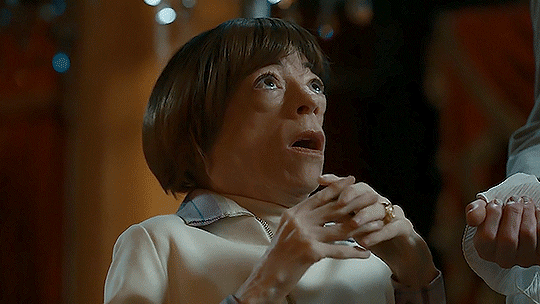
gender is optional/obsolete: Characters like Crowley, Muriel and others really undermine the (visual and aesthetic) boundaries of gender and the black-and-white thinking about gender that informs male gaze. Characters cannot be identfied simply as (binary) men or women anymore just by looking at them or by interpreting their personalities or behaviors. Most characters in GO, and especially the more genderqueer ones, display a balance of feminine and masculine traits as well as indiosyncracies that dissolve the gender binary.
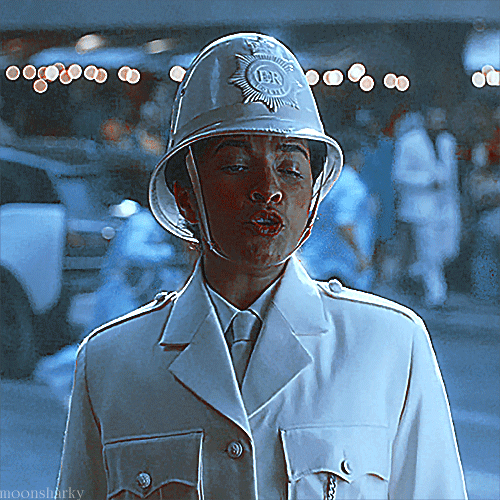
Feel free to add your own thoughts on this in the comments or tags!
#good omens s2#good omens#good omens 2#go2#good omens meta#ineffable husbands#crowley#aziraphale#queer#queer TV#male gaze#thank you neil gaiman for cranking up the queer#neil gaiman#thank you neil gaiman
2K notes
·
View notes
Text
Aziraphale, Raphael, and other angelic names you should probably know
Yes, I’m digging out my oldest piece of Good Omens meta. If you’re one of the very few people who might remember it from my main blog or had followed me on Twitter before it was shared there last year, you should already get the gist of what’s going to come next. For the rest of you, this might serve as a nice warning of how true brainrot begins.

We will start at the very beginning: the name-giving. Since God has created the world with one word, in the Bible and related Jewish tradition names of things are considered of great importance. As the life-givers, they imbue meaning and power to those who bear them, and often lead them towards a certain predetermined path. The concept of true names in general is a global phenomenon, with traces of this belief to be found everywhere from Plato's Theory of Forms through Grimm’s fairytales and beyond, not only in religious, but also philosophical and anthropological context. Considering the vast number of options to choose from, coining a new name instead of just repeating someone else’s is certainly a choice.

Unsurprisingly, the one who came up with the name Aziraphale was Terry Pratchett, and according to an interview it was originally pronounced Aziraphael:
“It should be Azz-ear-raf-AE-el, but we got into the habit of pronouncing it Azz-ear-raf-ail, so I guess that’s the right way now.”
Don’t worry, we’ll get there in a moment. The second thing you need to remember from this interview is Terry’s answer to the question about the name’s origin:
“It was made up but… er… from real ingredients. [The name] Aziraphale could be shoved in a list of ‘real’ angels and would fit right in…”
Conveniently, I’ve already explained who he was and why he was so important in Judaism in one meta discussion on Tumblr, so I’ll be lazy and copy-paste my thoughts and expand them to add some details from other Abrahamic religions.
Before the Beginning, or the Angel of Love

Long story short, Libbiel was one of the archangels working with God on the creation of humans. The idea was opposed by some of them, especially the Angel of Truth, who was promptly cast down from Heaven to Earth (but promised to spring back out of the Earth eventually, don’t worry).
Unlike Michael and Gabriel, Libbiel (“God is my heart”) warned his angelic troops to accept the Ineffable Plan in advance and saved them from the Fall, which granted him God’s recognition and a new name, Raphael, the Rescuer, appointing him as the Angel of Healing (“God has healed”).

This seems to check out within the Good Omens universe: Aziraphale was involved in the Earth creation project before the rollout and had enough access to the human plans to see them with his own eyes and share this knowledge with the angel that eventually became Crowley.
He also appeared extremely anxious at the very mention of Crowley’s obligation to dissent and wanted to save him from any negative consequences even at the cost of interrupting the conversation he’s been enjoying so much.

We’ve noticed some peculiar reactions of Aziraphale to any mentions or acts of love, right? They usually involve reaching out to Crowley and might either suggest his feelings toward him or how physically overwhelmed he is with the very concept of love (or both, actually).
Interestingly, one of the official titles of archangel Raphael is Angel of Love. In Christianity he is considered a patron saint of happy meetings, matchmaking and marriage, and his healing powers involve especially eyes and… heart, in the context of both mental health and human love.

Raphael also has a canonical (at least in Catholicism) episode of playing a human matchmaker on God’s behalf in the Book of Tobit, in which he appears on Earth under the disguise of a man named Azariah. Aziraphale seems now like an obvious portmanteau for Azariah, Raphael’s alias used while disguising himself as a human, and Raphael, the name given to him by God as a commendation. An archangel embracing some humanity of his own volition.
Raphael’s color is sometimes mentioned as light blue, exactly like the light Aziraphale emits in the S2 opening sequence, and his symbol is a serpent (the ancient Caduceus, but I feel like at this point we can call him Crowley).
The angelic couple, or Zophiel and Barachiel
Remember that bit of Terry’s interview about real ingredients? Raphael’s backstory already seems complicated enough, but what if Aziraphale had not one, but two angelic prototypes? I happen to know one more angel — a cherub said to possess great feminine energy — whose story rings some alarm bells.

This is Jophiel (“The Beauty of God”) or Zophiel (“My Rock is God”, “Widom of God”, “God’s Rage”), believed to be a companion to the angel Metatron, regent of the Principalities and leader of the Cherubim, a heavenly protector — one of the child amulet angels.
In Jewish tradition Zophiel takes on the role of the guardian of the Torah as well as other books and knowledge itself, based on the fact that he was the one to guard the Tree of Knowledge and, armed with a flaming sword, drive Adam and Eve out of Eden. He also watched over Noah and his family during the Flood and was serving as an assistant to King Solomon when he spoke on Wisdom and wrote the books of Proverbs, Wisdom, and Ecclesiastes. In the Anglican tradition he is recognized as an archangel and typically depicted with a fiery sword in hand. The color belonging to Zophiel is yellow.
Lynn Fischer in “Angels of Love and Light: The Great Archangels & Their Divine Complements, the Archeiai” (November 1996) describes Zophiel as one who
“stirs the feelings through radiation of illumination and into aspiration … help in absorbing information and studying for and passing tests; dissolution of ignorance, pride, and narrow-mindedness; and exposure of wrongdoing in governments and corporations. Jophiel helps in fighting pollution, cleaning up our planet, and brings to [hu]mankind the gift of beauty. He also provides inspiration for artistic and intellectual thought providing help with artistic projects and to see the beautiful things around us.”
While this angel is mentioned in other works of fiction, Zophiel makes his most notable appearance in John Milton’s epic poem, Paradise Lost, as the warrior “cherubim with the swiftest wings” in the battle of Heaven, where he was believed to assist Michael as the standard bearer. He’s presented as a spy returning from a reconnaissance mission to the rebel camp, much in the way Aziraphale had infiltrated Hell and fooled its demons in the wake of Armageddon’t.

As Zaapiel derived from Za’ap (Hebrew) meaning rage, anger or storm, he is also recognised as the angel of storms and, under the variant Zafiel, the angel of rain. This might be the reason why Zophiel is traditionally associated with the archangel of lightning and thunder, Barachiel (“God’s Blessings” or “Lightning of God”, especially when transcribed as Barakiel or Baraqiel) — to the point of being mentioned as his partner or consort.
Barachiel is the angel of lightning, but also — as the name suggests — blessings. In Catholic iconography he is usually depicted with a staff, a basket of bread, or a rose, each petal of which is representing a blessing from God, tossed out as the angel pleases to bless people. He is the chief of guardian angels, but in particular watches over young children, and sometimes takes on the task of delivering the blessing of offspring to prospective parents.
Like Zophiel is believed to have taught humans languages and wisdom found in books, Barachiel is commonly revered as the angel who taught them astrology, the wisdom of the stars.
Nothing lasts forever

Raphaelic legends aren’t all fun and games, but also mention the less marketed aspect of being an archangel: signaling the Day of Judgment. In Christianity, this is usually assigned as another one of Gabriel’s jobs, but he’s on the run right now, isn’t he? Well, good news! In Islam, Raphael is called Israfil or Israfel and believed to be the angel who blows the trumpet to signal Qiyamah, a counterpart of the Christian Second Coming, instead. The fact that Aziraphale has taken over Gabriel’s position in Heaven might be much less coincidental than some think.
And it’s important to remember that this power is not only destructive — while the first blow will kill all creatures and creations, the second one will revive them and prepare for the Last Judgment (yes, the very same one that in Christian belief will be administered by Jesus with the help of Book of Life). Very much in line of what Adam, the Antichrist, has done with the help of a certain shoulder angel and shoulder demon.
This is exactly the sentiment found in the poem “Israfel” by Edgar Allen Poe. In a material world nothing is meant to last forever, which is a curse and a blessing. A curse because it means death and destruction; miracles may sustain a certain bookshop in its current form through millennia, but as a tombstone to the life they led instead of a home it once used to be. A blessing, because it also means change and a new beginning — as long as there’s enough life force to replace whatever is lost in the process.
Nothing on Earth lasts forever, but we should use it for inspiration, savor momentary bliss, and hold it in our hearts. Only Heaven and the passions of its angels (fallen or not) are truly eternal.
And we can expect at least two of them to keep loving each other beyond the human concept of time, perhaps in a nice cottage on the South Downs.
#good omens#good omens meta#ineffable husbands#angelic companions#or whatever you want to call it#aziraphale#bamf aziraphale#aziraphale needs a hug#crowley is a sweetheart#not the kids#angel of love#archangel raphael#raphael#zophiel#baraqiel#metatron#israfel#nothing lasts forever#unless?#gnu terry pratchett#yuri is doing her thing#procrastinating again
149 notes
·
View notes
Text
Aziraphale's "Bait" Aesthetics in the Bastille Scene Opening Shot
I'm very late to this since it's season 1, but I'd like to talk a bit about the set-up of the Bastille scene and what it tells us, especially in the S2 context of "saving me makes him so happy."
Check out the composition of the opening shot:
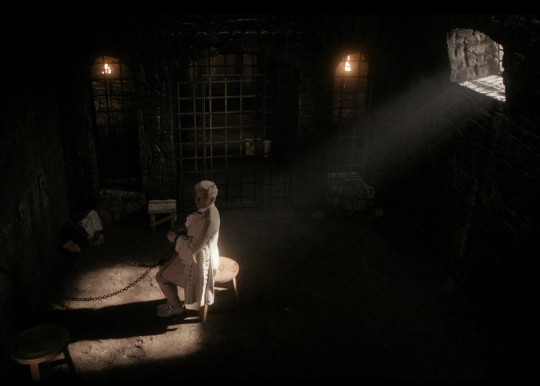
In this image, we can see Aziraphale in a cell, where almost the entire area is shrouded in darkness. And he's sitting on this little stool, with a literal spotlight on him filtering in from the window.
You know how hard it is to see into the dark when you have a spotlight on you? If you've ever been on stage, yeah, it's a challenge. That chain on his wrists is long enough that he could move if he wanted. But no, he chose this exact spot to sit, even if it's terribly inconvenient, and he probably can't see shit.
You know how in an adventure movie, where there's a guy stealing some treasure from a tomb, and how there's always some golden object on a pedestal, illuminated with some mysterious light filtering in from above?
Or how in a monster movie the people trying to hunt down the monster inevitably convince someone to stand around and act like bait?
Aziraphale literally sets up this whole scene to look like bait. Not only does he just want to be rescued, he also wants maximum aesthetics for it.
Like he's just waiting for some creature to pop out of the darkness to snatch him up (he is- that's exactly the point). He doesn't need to see into the rest of the room well because he knows exactly what lurks in the darkness and he wants to look as enticing as possible.
God the whole thing is just so unnecessarily and delightfully DRAMATIC.
992 notes
·
View notes
Text
I got randomly recommended this video by YT and wrote a ginormous comment in response because I have no self control, apparently, so I thought I might as well also share my thoughts here in regard to whatever is going with THIS FUCKING SMILE
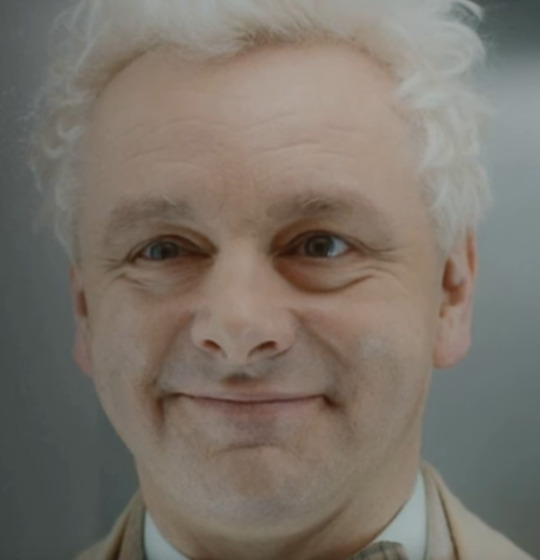
(under a cut to not clog y'alls dashboards)
(the first part of the comment here is a direct response to some of the ideas put forth in the video, it is very short so give it a quick watch for more context if you want)
Imo it's not necessary to look into overcomplicated theories that rely too much on off screen shenanigans to explain the smile, for how amusing the idea of them having swapped during the kiss is (like, the kind of stuff I won't want to be actually canon, but I'll be very happy to see explored in fan fics lol)
I think to fully explain that smile we have to take in consideration multiple factors:
This show is very purposeful in what it does and doesn't, well... show. That last shot is very long and I think the fact that Aziraphale's and Crowley's expressions in the aftermath of their disastrous break up is shown in such a manner tells us a LOT about the state of mind they might be at the start of S3, and the obstacles they'll have to face. Aziraphale doesn't immediately smile, rather he seems to look almost shell-shocked for most of the shot; it's clear (to me at least lol) that the quiet ride up the elevator is finally giving him some desperately needed time to fully digest everything that happened, because too much has happened in an extremely short amount of time, and we all know Aziraphale doesn't do well with speed lol.
But, for how much he can sometimes be a complete moron, he is smart, and all he needs are just those seconds of quiet to properly ponder on everything, on the choices made and the ramifications of said choices, and that's how we get to smile-- I'll delve into what I think Aziraphale is going through in his mind in more details later, because I also think it's necessary to focus a bit on Crowley's own expression, since the both of them are so intrinsically linked that the narrative cannot make sense without taking the both of them into account.
Crowley's expression is much more static and doesn't change the way Aziraphale's does; he looks profoundly tired in ways we've never seen him before. I don't think he's giving up on Aziraphale, and I fully believe the fact that he stood there and waited for Aziraphale to disappear in the elevator, the both of them sharing that last look, was a quiet message: He'll never give up on Aziraphale, he'll be there, waiting. But wait is all he can do for Aziraphale, now, because he can't follow where Aziraphale is going.
For how messy and full of heightened emotions the confession + kiss are, I think actually denying Aziraphale's request was a HUGE step forward for Crowley's character. He's never been able to deny Aziraphale, he always went back to him after every fight, and we all know how stupidly whipped for Aziraphale he is and how he'd empty the ocean with a spoon if Aziraphale asked him nicely-- But to actually put his foot down and say "no, I cannot do this for you" when asked to all but renounce the person he is now? Especially with how Aziraphale is all but begging him openly? That's a huge step, and something I think Crowley desperately needs to mature as a person (or, well, person-shaped being). We all love how Aziraphale has him wrapped around his little finger I'm sure, but we also all know that if they truly want to build a strong, healthy relationship they also both need to be able to keep their individuality and to put forth adequate boundaries about what they are willing to do for each other within reason.
Asking Crowley to come back to being an angel when he's made blatantly clear for six thousand bloody years how much he despises Heaven is not a 'within reason' request, innit?
So, yeah, for how heartbreaking the break-up was, in a sense Crowley needs it. They both do. They both need time apart to figure their own shit out, dismantle all those unhealthy habits they had to adopt in order to be with one another as safely as they possibly could while still 'employed', and then come back together with a clearer mind and a whole deal stronger than before, both as individuals and as a couple.
And I think how tired and downtrodden Crowley looks in that last shot is a precursor to this process, just as much as Aziraphale's smile is... So, let me get back to our favorite angel and what I personally think is going on with him.
I think to properly contextualize that smile we need to look at not just the happening of those infamous last fifteen minutes, but of S2 as a whole, and what Aziraphale does in it.
So, what is Aziraphale doing during S2?
At the start he seems to be more or less comfortably settled in his current life; he's as happy as ever doing what he's always done, enjoying humanity's creativity with his books and his music and his food and drinks, seemingly content to be puttering about in his bookshop (which is a stark contrast with Crowley's homelessness and his kinda adrift and depressed attitude). Of course then Jim!Gabriel throws a wrench right into that, but imo I think there was a lot more going on behind the facade of Aziraphale's well ingrained habits.
Sure, he still has all of his familiar comforts and his routine, but from the moment we see him interact with Crowley I saw a deep restlessness emerge in him: The panicked look he launches Crowley when Nina asks him about his 'naked man friend', the way he speaks with Crowley with all those 'our' he uses, the blatant way he keeps reaching over and touching Crowley-- To me that suggests that Aziraphale is clearly not as happy as he seems to be on a superficial glance. He clearly wants more with Crowley, wants to bring their relationship to the next step, but because the both of them are so deeply entrenched in their unhealthy coping mechanisms and habits and their inability to openly communicate it doesn't even occur to Aziraphale to just... You know. Take the first step, actually say something about it. So he just keeps throwing bait after bait in the water, hoping Crowley will bite and be the one taking the initiative as he's always done, finally allowing Aziraphale to accept said initiative, this time around.
Of course, we all see that Crowley doesn't take any first step, which is probably something deeply frustrating for Aziraphale at a subconscious level. That's how we get the ball; sure, on the face of it it was Aziraphale's way to make Nina and Maggie fall in love, but... Was it, really? Let's be real, for how entirely believable it is that Aziraphale makes up the lie about Nina and Maggie's love to cover for their miracle is, since we've seen him being anxious around other angels, I don't think for a second that had Aziraphale just stopped and spent three minutes thinking about it he wouldn't have found a way to convince Muriel that Nina and Maggie were, in fact, in love, especially with how 'green' Muriel is about humans.
I fully believe that Aziraphale is not properly thinking during S2, period. He's frustrated by his inability to bring his and Crowley's relationship to what he wants it to be, and that frustration and single-minded objective is utterly obfuscating his thought process. There are plenty of moments he seemed almost manic, imo, which I read as another sign about his 'impaired' (allow me the term) state of mind as of S2.
So, yes, the ball: On the face of it something to actually turn his lie to the Archangels into truth, but deeper down, perhaps almost unconsciously, I think Aziraphale sees the ball as a way to finally make him and Crowley happen. That fact that he's taking pointers about romance from human literature is blatant, and obviously he truly does believe the ball will be THE way to make love bloom.
If you stop and think about it, the ball scene is terrifying. These people are being manipulated to play the perfect background parts to make, what is in Aziraphale's mind, the height of romance atmosphere happen. The fact we get a juxtaposition with Nina's "what the F is going on, am I losing my mind???" rightful attitude underlines this. And I truly believe Aziraphale isn't exerting said manipulation with intent, but rather doing so subconsciously, because he's just so fixated on the idea of having finally the perfect set-up to have Crowley as he desires that he is influencing everything around him. After all, we all know they both have the tendency of making things happen the way they want simply by thinking that's how things are supposed to happen.
And again, he's so manic and giddy when he asks Crowley to dance, his ass is not LISTENING. He literally needed a brick thrown through a window to snap out of it.
So, in the present we have an Aziraphale who , in his own way, is trying to take the initiative, come out with plans. There is a moment that I think might have slipped under the radar of a lot of people but that's frightfully important about who Aziraphale is at this point in the story, and who he will need to become: "I have a plan," Aziraphale said to Crowley during the stare down with the demons outside of the bookshop after the ruined ball; Crowley didn't even seem to have registered that sentence at all, because his mind is already projected forward and going a mile a minute about what to do to keep both the humans and Aziraphale safe in this situation.
Crowley, who loves to swoop in and save Aziraphale, doing what he's always done to keep his angel safe, even to the detriment of their relationship with one another... And Aziraphale, who adores playing the part of the damsel in distress in turn, is actually telling Crowley that *he has a plan*.
That's not something to take lightly, methinks. That's very much just another sign that Aziraphale's individuality is struggling, trying to emerge through Aziraphale's anxiety and doubts and fears and deeply ingrained habits. Aziraphale's cognitive dissonance in regards to heaven, and his shaken faith in God are huge motivators of his actions, and in the grand scheme of things the scant few years he had away from under the oppressive thumb of heaven is nothing. It was barely any time at all in the face of the eternity of an immortal life spent under that oppression, and yet we are already seeing little glimpses of Aziraphale's rebellious side struggling to get fully free.
I think these little glimpses inform us at great lengths about the evolution Aziraphale's character will go through in S3, and greatly explains that strange smile right at the end; in my opinion that smile isn't the smile of someone who's trying to convince himself that he's ok, or realizing that Crowley loves him (he knew already, they both knew and have known for a long time, their inability to properly express those feelings was their downfall, but I don't think either of them has doubted even for a second when it comes to how much they love one another). In my opinion that smile is the smile of someone who is steeling himself for what he envisions in his future; equal parts old-sedated anxiety and yet determination to actually enact plans he's surely concocting in his brilliant little mind. That's the smile of someone who has just realized that not only they can, but that they need to do something, and you can damn well be sure they won't be sitting and twiddling their thumbs waiting to be saved, but they'll be the one saving themselves and everybody else along with 'em, this time.
Just as Crowley needs to actually spend some time define himself as himself, and not just in relation to Aziraphale, Aziraphale needs to spend some time shedding all those fears and doubts that are weighing him down, and emerge the other side someone much more self-assured and ready to do what he thinks is right without all the hesitations that have indirectly been strengthened by Crowley; in a way, by allowing Aziraphale an out with his 'temptations', Crowley had been feeding into those hesitations, and had been holding Aziraphale back from fully maturing, even if not done on purpose, obviously. Imo is very important for Aziraphale's character that he comes to realize that he doesn't need those excuses Crowley gifted him to keep doing what he thinks is right, that he actualizes his own morality properly, and enacts on it.
I don't have the faintest clue about what is going to happen in S3, but I do fully believe the above paragraph is what Aziraphale and Crowley's respective character arcs will focus on. And once they'll come back together they'll be the most power couple that has ever power coupl-ed, and the Metatron will have no clue about what is about to hit him >:)
#good omens#good omens 2#meta#I want Aziraphale to Fuck Shit Up in S3#you think I was joking with that comic I drew some time ago?#I am NOT!#LET AZIRAPHALE FUCK SHIT UP HE DESERVES IT
722 notes
·
View notes
Text
I’ll forever be grateful to Rob, Rhi, the Pratchett Estate & Narrativia for fighting for Good Omens.
It’s exceedingly clear that we, as fans, owe them A LOT. And we need to thank them. And we DON’T do that by acting as petulant children and not watching what they create. So don’t boycott, or whatever some people are calling for. Yes, polite calls for more time, budget, etc are great. Childish tantrums, no. It just ends up in your toys being taken away. Trust me.
I’ve found a lot of people’s assumptions regarding the finale’s plot interesting. Terry never witnessed the fan reaction to the series. Sure, there was shipping of Aziraphale & Crowley, but nothing like after it hit TV.
I doubt he would’ve really cared all that much, either.
His focus would be on the intricacies of the Armageddon 2.0 storyline for this finale. The zombies (dudes [gn], there’ll be undead everywhere), Jesus coming back, etc. We know he’d want to discuss the underlying nuances of the politics in Heaven & Hell and how they’re just two sides of the same coin. And isn’t it all of Them vs all of Us?
Of course our Ineffable Duo will be there. But don’t forget they weren’t actually the sole focus of Good Omens, the novel. The one Terry wrote 75% of.
I really hope we’ll get 1941 Pt 3, and a few other bits of historical context, but for the most part, that’ll be left to us to write in fanfiction.
GO The Finale will, in all likelihood, focus almost exclusively on the here & now.
I’d really recommend to anyone struggling to have a (re-re-re-x infinite)re-read of the novel, and other Pratchett works, particularly his Discworld novels. Small Gods and Pyramids are good ones for religion.
Anyway, enough from me. I’ll definitely be writing more in-universe fanfic, especially as it’s unlikely we’ll see any of the historical scenes I’ve been wanting to research. I’ve got a BIG work planned which I’m doubly committed to writing now.
#good omens#good omens 3#good omens movie#gnu terry pratchett#ineffable fandom#good omens fandom#text#just my thoughts#lots and lots of them
144 notes
·
View notes
Text
The thing is. When people look at Book Omens and Show Omens there are a few different things that can happen. Sometimes you get people who try and shove them into one universal true canon. Sometimes you get people totally dissociating them from each other into two separate entities. And, to be clear, I don’t think either of these options is inherently bad to do - I myself defaulted to the latter for quite awhile after season 1 aired - and I always think folks should choose to view these characters in the way that makes them happy. For that matter, I think that there's nothing wrong with disliking a version or preferring one over the other or even ignoring one exists. But, I do think a lot of analysis I have seen has a tendency to remove the characters from their context in a way that does them a bit of a disservice. Because their context matters quite a bit.
Book Omens and Show Omens were made in two very different worlds facing two very different problems and two very different futures stretching out in front of them. The Book belongs in the context of a world on its way out of the Cold War while the Show belongs to a world starting to buckle under the weight of capitalism’s pressure. The evils in the story reflect these two world states - which I think is a good thing. As much as I love the book, if the show had just done the Cold War allegory, I don’t think it would’ve hit quite the same way and could've easily felt dated.
The most notable impact narratively from this shift is the fact that Heaven and Hell both have a more constant presence. Show Aziraphale and Crowley feel far more watched and actively monitored than they do in the book, especially in Aziraphale’s case. His relationship with Heaven especially is far more ‘boss checking the quarterly numbers’ or ‘oppressive family head checks in on their younger sibling’ than it is ‘spy reporting his findings’. And this shift is a huge one as far as what it means for our characters and their context.
Take for example, a small exchange of dialogue in the book where Crowley and Aziraphale do something that we know for a fact would never happen in the show - where they discuss the admittedly slim possibility of each other’s side granting of each other asylum. This is dialogue that works quite well if you’re looking at them as two spies with wavering loyalties but does not work for the show version of our protagonists, because the pressures they face from Heaven and Hell are different. The same thing goes in reverse for the Bandstand scene - a scene that is not in the book at all because it works far better in a show interested in a character facing pressure from a toxic family than it would in a book where Heaven’s presence is a very distant one.
And this right here is where we end up with the question of character consistency. There’s traits that each version of Aziraphale and Crowley have that the other does not, which leads to them feeling like two sets of characters in a way that can make them feel like the show is occasionally out of character. But it’s not really that, I don’t think. I think that's just a side effect of viewing them out of context. And I think a lot of those differences and the ways they manifest make a lot more sense if they're viewed like aus - because that's what they are in a lot of ways. The Book is a Cold War au and the Show is a modern au. They’re different, yes, but still undoubtedly them.
#good omens#book omens#crowley#aziraphale#show omens#good omens season 2#rambles#just been rotating this in my head for a few days#one of these days ill ramble about crowleys optimism but for now have this
1K notes
·
View notes
Note
Hi Mr Gaiman! Part 3 of my eternal apologies for making your inbox count larger than my vet school loan amount.
I’ve noticed multiple scenes where Aziraphale gazed longingly upon Crowley in a way we all very much wish to but I’m curious on the intentions behind that outside of the character context. The most notable I can recall is in series 2 when discussing the past tense of ‘smite’ and Aziraphale says “Smitten,” with a grin. Of course, this IS an accurate past tense of ‘smite’ but also contains a double-meaning and I’m certain Aziraphale is aware of that when saying it (especially while looking at Crowley). Was his loving gaze in this scene and others intentional within the relationship development of A&C, either by script or by design of one Mr Michael Sheen, or was it simply an artifact of Michael Sheen gazing upon David Tennant?
Incredibly grateful for all you do,
-M
It's Aziraphale looking at Crowley.
2K notes
·
View notes
Text
Good Omens: Lockdown and Crowley not mentioning his living situation in S2*
*till S2E6 when he asks if he can have his apartment back bc he's bored of living in his car but Aziraphale doesn’t hear bc mentally he’s in Alpha Centauri.
Having read the 'Crowley doesn't tell him' Neil Gaiman ask close to when I first listened to Lockdown (I lived under a rock until recently), my initial thought was HAS HE BEEN LIVING IN HIS CAR FOR YEARS?! but I think he was still in his apartment in 2020:
as far as Hell knows, Crowley just had a pool party in holy water (the holiest) so the higher-ups are probably willing to give him some space (plus Beelzebub is busy going on pub dates w Gabriel)
while there should be ~8 months between the end of Season 1 events (The Very First Day of the Rest of Their Lives on Sunday, Aug 25, 2019) and the Lockdown phonecall (on or near the 30 year anniversary on May 1, 2020), I can't imagine that's a very long time for Hell, especially if you're understaffed and busy dealing with fallout from Almostgeddon / going on pub dates
Shax dropping off mail and asking about the boiler seems like something one does in the first few months of living somewhere, not ~3 years in (if S2 is in 2023)
That said, I think the phone call underlines why Crowley never directly tells Aziraphale that he is living in the Bentley in S2, and it's just a great conversation (all hail Gaiman) sooo I wrote about it:
***Note: This post analyzes the Lockdown phonecall from Crowley's perspective only. Our heroine is feeling quite emotionally vulnerable at this point in time so things are going to hit him harder than they normally would.
I do not think Aziraphale meant to cause him pain (!!) but Crowley can't see that yet and I've written this post in a way that reflects that missing insight. (I explain in more detail in this reblog if you are interested) I am working on a companion post for Aziraphale's side of this conversation and how I think it affects his behavior in S2 because if we know anything about these two, it's that their exactlys are different exactlys.***
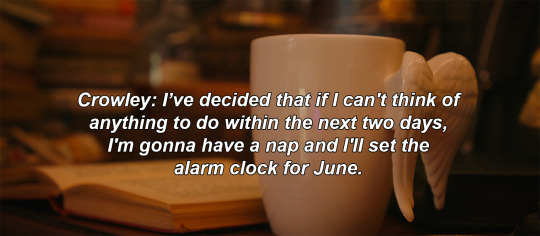
Crowley’s habit of sleeping to skip time like an RPG character by a campfire amuses me to no end, but in this context it feels heavy. Crowley already worries about losing time with what he loves and he probably hoped things would be different between him and Aziraphale after the events of S1. But things don’t change much. Then lockdowns start, and Crowley is trapped in his apartment alone, transcendentally bored, and unable to make his brain shut up. Sleeping a month away starts to sound less awful.
But Crowley hasn’t given up yet; he’s still awake when Aziraphale calls, and he’s even giving it two more days. Was he waiting for Aziraphale to call? Is it even possible not to at least kind of wait for someone’s call when you are cut off from everything and the caller has been your only friend and crush for millennia?
Aziraphale asks why Crowley isn't "out and about" tempting people or setting a bad example and he responds:
C: Everyone's so miserable and cooped up right now anyway, and I just… well… don't have the heart for it. A: *glowing audibly* I'm not miserable~ C: Really?
Crowley sounds genuinely surprised at Aziraphale's happiness and quickly assumes it's because the angel has been around people. He's so lonely/depressed/in his own head that he hadn't even considered someone enjoying being 'cooped up'. *sob*
Aziraphale goes No actually I put the closed sign up in the window and I'm having the Time of My Life, never had so few customers, not in 200 years!, etc. Although, he says:
A: …There were a few young lads a couple of nights ago who broke in through the back and tried to steal the cashbox! But they soon saw the error of their ways~ C: *clearly amused* Did you smite them with your wroth? A: Well I certainly gave them a good talking to, and I sent each of them home with cake~ C: *annoyed, swooning* Cake? A: Quite a lot of cake, actually. C: *physically ill from having such a giant crush on this dumbass baker/security guard* eeeekkkgghhh I'm gonna regret asking but.. ...rrgh.. *30 seconds of Aziraphale joyfully describing his baking while Crowley probably tries very hard not to imagine the angel eating each item in sensual slow motion* I stg you can hear him struggling in the background once or twice
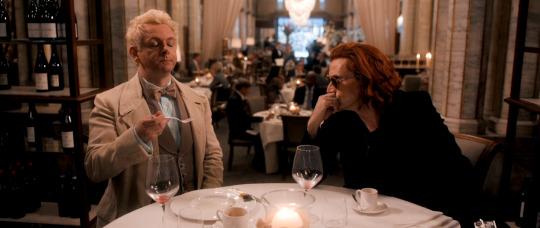
A: …And once I've baked them, I have to eat them all myself, which was why I was so delighted— C: To send your burglars home laden with baked goods, yes, nnyeaayeah I follow…
Crowley interrupts, finishing Aziraphale's sentence in his nervous hurry to say the next bit:
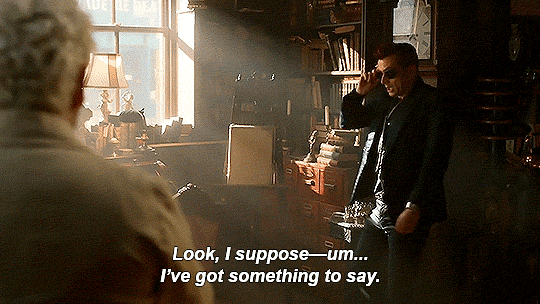
C: *loud inhale* You know, I could.. hunker down at your place. … Slither over and watch you eat cake. I could bring a bottle--a case of… something… drinkable…?
He's trying to sound so casual about it but this is someone who was rejected/abandoned by actual literal God after asking what he thought were welcome, uncontroversial questions. Asking makes him vulnerable. He's supposed to be the rescuer, not a demon in distress. He does not feel casual about asking.
Crowley knows it's unlikely but he's so miserable and desperate for company that he can't help but ask, just in case. Even the smallest chance of spending time trapped indoors with Aziraphale—with nothing to do but drink, watch him eat, and talk about things they'd normally avoid—is too tempting.
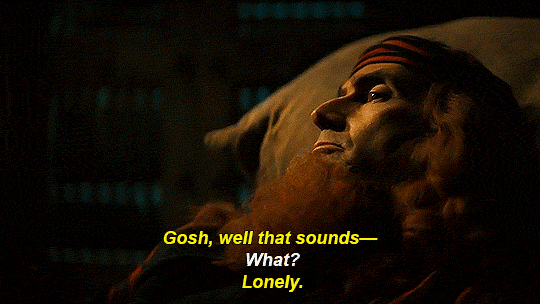
A: *panicking* Oh I— I— I— I— I'm afraid that would be Breaking All The Rules! *nervous breathing* Out of the question! I'll see you… when this is over. C: Right. gnnehh. I'm setting the alarm clock for July. Good night, angel. *dial tone*
And just like that, Crowley doesn't need two days to decide. The depression nap doubles in length. He doesn't hear how badly Aziraphale wants to say yes behind the fear, or maybe he does and it hurts worse because why isn't Crowley enough for him? You can almost hear the spiralling:
SHOCKING, asking made it worse. It always does doesn’t it? Why even bother? you just embarrass yourself.. SLITHER over? why did I say that *grumble grumble* of COURSE His Holy Holiness, your only friend in the universe, would rather eat cake by himself while everything goes to shit than ~deign~ to have you in his presence. "AsK aND yE sHaLl ReCeIvE" bugger this for a lark im going to bed
(a bit dramatic but we've all been there)
I imagine sleep doesn't come right away. Maybe his thoughts drift to when he sat beside the angel at a dark Tadfield bus stop after a rather eventful Saturday. Crowley must've felt a tiny bit hopeful when he invited Aziraphale to stay with him: Heaven had withdrawn its favor and the bookshop was gone; Aziraphale was like him now. Didn't that mean things would change?
"I don't think my side would like that." Apparently not.
In the end, Aziraphale did ride the bus back to Crowley's apartment and stayed till the next morning when he caught a cab, but only to sell the illusion. Crowley understood that as far as sides went, the angel was still on Heaven's, even if Heaven wasn't on his.
And now this: the entire world is shut down; there is nothing for Aziraphale to do but stay in and read and bake in his magically reconstituted bookshop and he still won't invite Crowley in. Burglars and un-fallen angels only—nobody who asks questions.
So... of course Crowley doesn't tell Aziraphale when he loses his apartment. He already knows what answer he would get; the angel has told him so many times. Aziraphale is a company man first, a companion to one very sad owl when convenient.
If Crowley works up the courage to say 'please take me in, I have nowhere else to go' and Aziraphale goes 'sorry, no, far too political, but I WILL risk being erased from the Book of Life to protect this nude amnesiac former coworker who always hated me,' it's going to be too much. You can't sleep long enough for that type of hurt to go away. Better not to say anything.
"Then nothing has to change, does it?"
#edited to add the note about crowley's perspective right after the cut! apologies if it seemed anti-aziraphale before!#good omens meta#good omens lockdown#good omens 2#ineffable husbands#ineffable spouses#ineffable divorcees#i can't even imagine navigating the pandemic brain scramblies while pining THAT HARD#Aziraphale is a company man (gn) but i think S3 will cure him of that#long but if i can't write essays about this on tumblr then where#good omens spoilers
762 notes
·
View notes
Text
Whose POV is it anyway?
An Introduction
DO NOT ASK NEIL ABOUT FAN THEORY
Cracking down on the storytelling of Good Omens season 2 through the lens of a changing narrator.
If you haven't read this interview with Good Omens cinematographer Gavin Finney, and you're interested in the fantastic dedication and detail that went into this TV show, definitely give it a read. Not only is it lovely, but Neil also posted the article with a caption mentioning that it's got so many secrets in it. Obviously that made me take a closer look.
I have already gone into a fair bit of detail about the different Lens Filters that Finney mentions in the article in a separate post and I will be referring to them quite a bit so if you aren't familiar with them I would suggest reading that first!
This first post is going to cover the basics of changing narrator/POV's and I'll be writing additional posts for separate episodes/minisodes/scenes since there's obviously way too much to cover in a single go. So shall we take our first look?
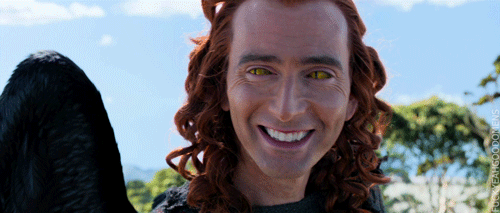
It's no secret that something's a *bit weird* with season two, and there are SO many theories about it. I love to read speculation, metas, theories, and opinions, it's definitely fun but my personal ideas align more with the idea that we're simply being shown the events of season 2 through the memories of multiple narrators, different POV's, and it slightly skews the story, sometimes within one continuous scene.
I am also a sucker for a good multiple timeline theory but that isn't this post.
Lens Filters
As I stated above, I wrote a post about each of these individual filters earlier. What I didn't go into in that post was speculation about the filters. While I think they're pretty straightforward, especially the filter for hell (Black Pro-Mist ((BPM)), I think the other two have a bit more room for speculation.
Bronze Glimmer Glass
BGG was described by Finney as being used for 'bookshop scenes', but after S2 back numerous times and paying as much attention as I could to the lighting and colouring of the scenes, I think this is generally true but not always true. There are times when bookshop scenes seem to use a different filter, and other locations also seem to be shot with the BGG filter as well. I think BGG aligns with Aziraphale's POV. Or if Not Aziraphale, an outside-of-Crowley narrator? Based on the scenes (which we'll specifically get into in other posts) which BGG seems to be used, context clues, character behavior, etc, I think BGG clues us in that we're seeing, if you will, through Aziraphale's eyes.
Black Diffusion FX
BDFX was described as being used for 'Crowley's present day storyline' and fuck me, that's not ominous or weirdly phrased at all Mr. Finney! This filter definitely aligns with Crowley. Most of the time he's separate from Aziraphale it seems that this is the filter being used, and certain scenes switch filters mid-scene when he begins to go off on snarky Crowley-centric commentary.
Catch-22 & Herzog
The books on Gabriels bookshelf, great books obviously, but I think books that are also meant to give us context about the story. Pride and Prejudice is a love story about making snap judgements on someone's character, and coming to recognize somebody might be good despite their title or appearance. The Crow Road is a story about life, death, love, morality, mystery, and God. 1984 details the tragedy of Julia and Winston's attempt at falling in love while living under in a police state. You see my point?
That's why I wanted to touch a bit more on Catch-22 and Herzog specifically when talking about the possibility of changing narrators/POV's in Good Omens 2.
Catch-22 frequently switches narrator and the events described are often not necessarily sequential. This way you're getting information about previous scenes as the story continues, so while you're reading the book you're forming a more complete image of the events as the story continues from different characters POV's and iterations of the story. Sound relevant?
Herzog is the other book I wanted to talk about. To be fair I haven't read Herzog in full like I have Catch-22 but I pulled out my copy to reference and flip through a bit to remind myself. Herzog unlike Catch-22 doesn't switch narrators but the narration by the main character, Herzog himself, switches between first and third person throughout. When he is narrating through his letters, you get a deeper look at his thought processes and emotions. It also relies on flashbacks to bring context to the life of Herzog.
While these books touch on other elements that are relevant to the Good Omens story, namely Yossarian's relationship and views of God in Catch-22, the way these stories are told intrigued me for this context.
Crowley's Hair
Yeah I'm gonna mention the hair, because I think the hair is linked. Crowley's shorter sideburns, trimmed mutton chops in the 1827 flashback, and shorter Job wig seem to be clearly aligned with the BDFX filter/Crowley's POV as far as I can tell. I don't know if this means it's just another way to denote POV, but it seems way too consistent not to mention it. The longer sideburns, fuller mutton chops, and longer Job wig all match up with Aziraphale's POV or the BGG filter. My thoughts here are that his hair is another hint of who may be relaying the information to us, AKA is it internal or external. I am making my best guesses though and there are still some situations that I feel less sure about. For example, when Aziraphale takes the Bentley to Edinburgh and Crowley is in the Bookshop with Jim his sideburns are long, is it because he's remembering these scenes unreliably? Is Aziraphale imagining the events? Is it because Jim is present? A brief fluttering thought I toy with from time to time is the fact that in the before-the-beginning scene they are long, and what that means in context of the rest of the season.
S2 Promo Posters
Finally this set of season 2 promo posters showing the characters thoughtfully considering scenes in their heads just gives me a lot of these POV vibes.
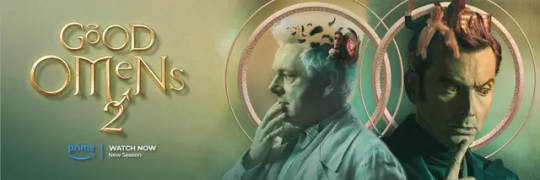
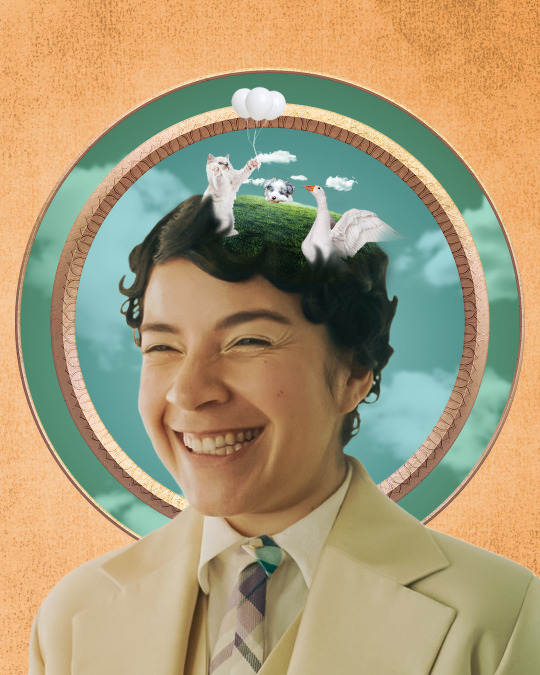
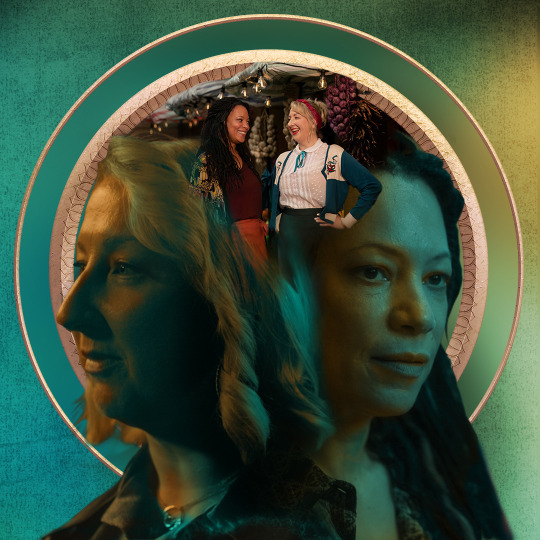
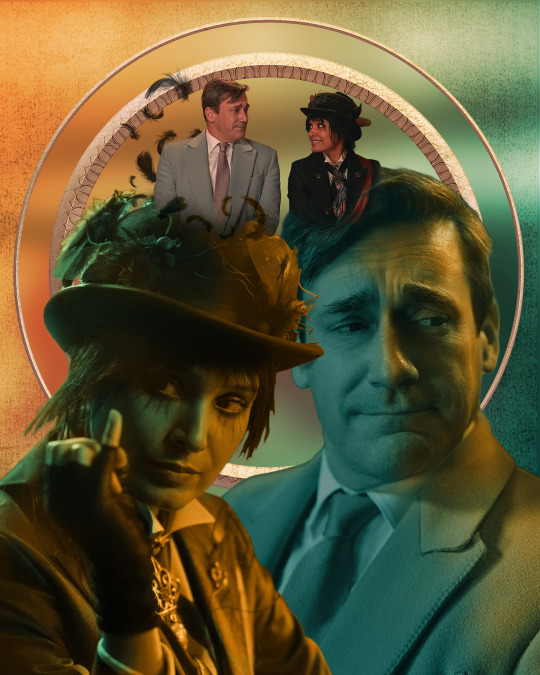
I'm planning on doing individual posts for specific scenes, episodes, and minisodes that require detailed breakdowns. I'll update this list with links as the posts are finished!
POV "Your 'Something's Wrong' Voice"
POV a Trip to Hell and a 25 Lazarii Miracle
POV a Companion to Owls
POV The Dirty Donkey & I think I Found a *Clue*!
POV Bodysnatchers & Cosplaying a bookseller
POV 1941
POV The Ball
POV The End?
Whose POV is it Anyway - a Conclusion
#good omens#good omens 2#michael sheen#david tennant#crowley#aziraphale#good omens meta#crowley x aziraphale#good omens theories#good omens clues#good omens fandom#ineffable husbands#good omens clue#good omens theory#good omens pov#good omens writing#good omens 3#good omens filters#ineffable mystery#ineffable divorce#ineffable spouses#ineffable idiots#ineffable fandom
257 notes
·
View notes
Text
Ok. *rolls her sleeves* You want face value? *rubs her hands* I'll give you face value.
Crowley hates his plants.
He shouts at them, belittles them and k*lls them. He says horrible things to them and the fact that he k*lls the plants off screen is no reason for us to doubt that he does. Because we trust his words in that particular scene. His behaviour throughout both seasons, especially season 2 where the only thing he takes with him from his former flat are the plants, is absolutely irrelevant of course.
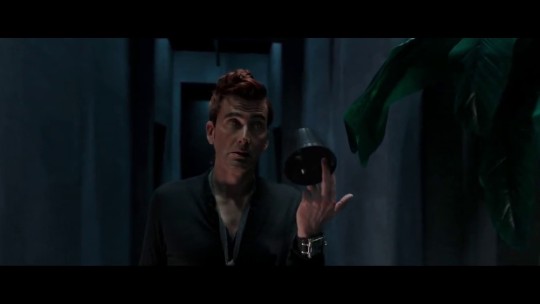
Crowley thinks Aziraphale is stupid or that he is an idiot. If he says so in situations of stress, in situations where the context suggests he's desperate for the angel to see things his way the context is just irrelevant, because he says that Aziraphale is an idiot. If the rest of the series shows us that he trusts Aziraphale and his intelligence greatly, that's irrelevant because in a couple of scenes he said that Aziraphale is an idiot.
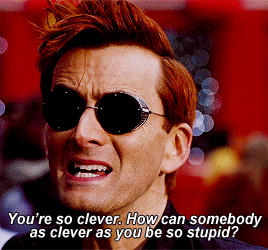
If Crowley had gone to Alpha Centauri he WOULDN'T EVEN HAVE THOUGHT about Aziraphale. That's what he said, so it must be true.
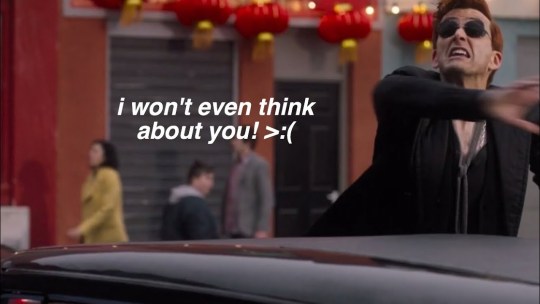
Crowley actually wanted Muriel to arrest him because he's a demon. That's what he said, so it's exactly what he meant. That the unfolding of the story suggests that was a trick to get to heaven is irrelevant.
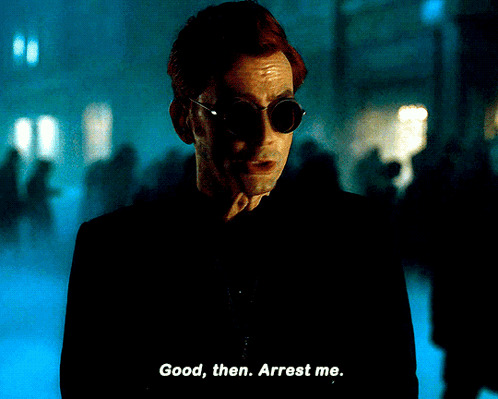
In Rome Crowley was an aardvark. Obviously.

Aziraphale is just an angel Crowley knows. Exactly like Sandalphon.
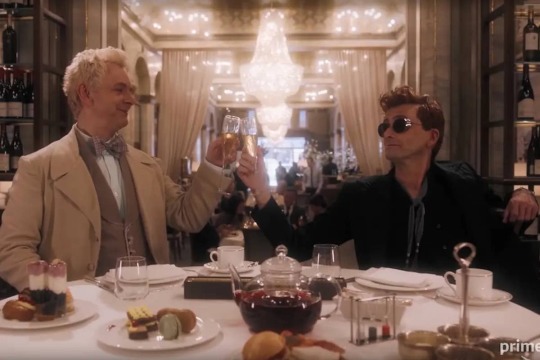
Crowley clearly wanted to k*ll Job's children. The whole goats-turned-into-crows thingy? Irrelevant.

I'm sure that if you take Aziraohale's words towards Crowley during the final fifteen at face value you'll agree with me that everything else in the show is to be taken at face value.
I invite everyone to come up with more examples.
308 notes
·
View notes